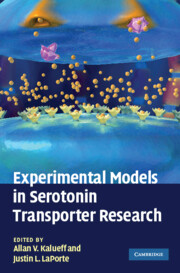Book contents
- Frontmatter
- Contents
- List of contributors
- Preface: Focus on the serotonin transporter
- 1 Presynaptic adaptive responses to constitutive versus adult pharmacologic inhibition of serotonin uptake
- 2 Cellular and molecular alterations in animal models of serotonin transporter disruption: a comparison between developmental and adult stages
- 3 Developmental roles for the serotonin transporter
- 4 SERT models of emotional dysregulation
- 5 The serotonin transporter and animal models of depression
- 6 The serotonin transporter knock-out rat: a review
- 7 Wistar–Zagreb 5HT rats: a rodent model with constitutional upregulation/downregulation of serotonin transporter
- 8 The role of the serotonin transporter in reward mechanisms
- 9 Modeling SERT × BDNF interactions in brain disorders: single BDNF gene allele exacerbates brain monoamine deficiencies and increases stress abnormalities in serotonin transporter knock-out mice
- 10 Primate models in serotonin transporter research
- 11 The role of serotonin transporter in modeling psychiatric disorders: focus on depression, emotion regulation, and the social brain
- Index
- Plate section
- References
1 - Presynaptic adaptive responses to constitutive versus adult pharmacologic inhibition of serotonin uptake
Published online by Cambridge University Press: 06 July 2010
- Frontmatter
- Contents
- List of contributors
- Preface: Focus on the serotonin transporter
- 1 Presynaptic adaptive responses to constitutive versus adult pharmacologic inhibition of serotonin uptake
- 2 Cellular and molecular alterations in animal models of serotonin transporter disruption: a comparison between developmental and adult stages
- 3 Developmental roles for the serotonin transporter
- 4 SERT models of emotional dysregulation
- 5 The serotonin transporter and animal models of depression
- 6 The serotonin transporter knock-out rat: a review
- 7 Wistar–Zagreb 5HT rats: a rodent model with constitutional upregulation/downregulation of serotonin transporter
- 8 The role of the serotonin transporter in reward mechanisms
- 9 Modeling SERT × BDNF interactions in brain disorders: single BDNF gene allele exacerbates brain monoamine deficiencies and increases stress abnormalities in serotonin transporter knock-out mice
- 10 Primate models in serotonin transporter research
- 11 The role of serotonin transporter in modeling psychiatric disorders: focus on depression, emotion regulation, and the social brain
- Index
- Plate section
- References
Summary
ABSTRACT
Many antidepressants are believed to relieve depressed mood and excessive anxiety by inhibiting the reuptake of serotonin so as to cause increases in extracellular serotonin. This homeostatic alteration is thought to underlie further adaptive processes – which have not been fully clarified – that together constitute the cellular mechanisms of current antidepressant therapy. Here, we review the literature on presynaptic adaptive responses to chronic antidepressant treatment, focusing on alterations in serotonin transporter (SERT) expression, extracellular and intracellular serotonin levels, and serotonergic innervation. We contrast this with studies on constitutive loss of SERT gene expression. A partial genetic reduction in SERT expression results in modest increases in extracellular serotonin, while the total absence of SERT is associated with substantial increases in extracellular serotonin, decreases in intracellular serotonin, and a reduction in serotonin immunopositive cell bodies and axons in the dorsal raphe and hippocampus, respectively. Adaptive changes in SERT protein levels and extracellular and intracellular serotonin concentrations following many different regimens of chronic antidepressant administration were found to be more variable, often falling in between those resulting from partial and complete genetic ablation of SERT. This might reflect incomplete pharmacologic inhibition of SERT and the wide variety of drug administration paradigms utilized. The microdialysis literature, in particular, suggests that it is difficult to conclude that chronic antidepressant treatment reliably causes elevated extracellular serotonin.
- Type
- Chapter
- Information
- Publisher: Cambridge University PressPrint publication year: 2010

